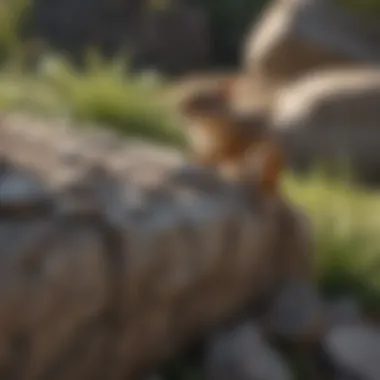Expert Strategies for Keeping Chipmunks Away from House Foundations


Preventive Pest Control Strategies
When it comes to safeguarding your home against unwanted guests like chipmunks, implementing preventive pest control strategies is paramount. By focusing on various aspects of your property, you can create a barrier that deters these rodents from causing havoc near your house foundation.
House Exterior Protection
- Tips for sealing cracks: Inspect your home's exterior for any cracks or openings where chipmunks might gain entry. Seal these areas using appropriate sealants to prevent them from finding their way in.
- Clearing debris: Remove any clutter or debris around your house that could serve as hiding spots or attract chipmunks. This proactive measure helps in reducing their presence near your foundation.
- Preventing pests from entering: Install mesh screens on windows and doors to prevent chipmunks and other pests from entering your home. Regularly inspect these screens for any damages and repair them promptly to maintain their effectiveness.
Yard Maintenance
- Essential yard care routines: Ensure your yard is well-maintained by regularly mowing the lawn, trimming bushes, and removing any overgrown vegetation. By keeping your yard tidy, you can create an environment that is less attractive to chipmunks.
- Methods for keeping yard pest-free: Consider using natural deterrents like planting mint or garlic around your yard, as chipmunks are known to dislike these scents. Additionally, installing motion-activated sprinklers can startle and discourage chipmunks from frequenting your yard.
Indoor Cleanliness
- Expert cleaning tips and techniques: Maintain a clean and clutter-free indoor environment to eliminate hiding spots for chipmunks. Regularly sweep, mop, and vacuum to prevent food crumbs and other debris from accumulating, making your home less appealing to these rodents.
- Maintaining a pest-resistant indoor environment: Store food in airtight containers, fix any plumbing leaks promptly, and seal off potential entry points such as gaps around pipes or vents. These measures help in fortifying your home's defense against chipmunk invasions.
Garbage Disposal
- Efficient waste disposal methods: Secure your garbage bins with tight-fitting lids to prevent chipmunks from accessing them. Additionally, consider using animal-proof containers or enclosures to deter these pests from rummaging through your trash.
- Importance of proper garbage disposal: Avoid leaving food scraps or organic waste exposed in your yard, as these can attract chipmunks and other pests. Practice proper garbage disposal techniques to minimize the risk of infestations near your home.
Other Pest Prevention Strategies
- Innovative ways to safeguard your home: Explore alternative pest control methods such as installing ultrasonic devices or incorporating natural predator species like owls or hawks in your area. These creative approaches can complement traditional measures and enhance the protection of your property.
Understanding the Behavior of Chipmunks
Chipmunks are fascinating creatures whose behavior plays a crucial role in understanding how to keep them away from house foundations effectively. By delving into the habits and tendencies of chipmunks, homeowners can gain valuable insights that can aid in developing targeted strategies for pest control. Understanding the Behavior of Chipmunks allows individuals to comprehend why these animals are attracted to specific areas, such as house foundations, and how they establish their habitats. Detailed knowledge about chipmunks' behavior patterns enables homeowners to anticipate and prevent potential infestations. By studying their behavior, one can implement proactive measures to mitigate the risks posed by these rodents.
Dietary Habits of Chipmunks
Chipmunks have distinct dietary preferences that influence their foraging behaviors and habitat selection. Identifying Chipmunks' Food Preferences is a critical aspect of understanding their behavior as it sheds light on what attracts them to certain environments, including residential areas. Chipmunks predominantly consume nuts, seeds, berries, and insects, making them agile scavengers with a diverse diet. Recognizing the specific foods that chipmunks are drawn to is essential for homeowners seeking to deter them effectively. By understanding their food choices, individuals can tailor their repellent strategies to disrupt chipmunks' feeding patterns and discourage their presence near house foundations. Identifying Chipmunks' Food Preferences equips homeowners with valuable information to protect their properties from potential damage caused by these small rodents.


Nesting Patterns of Chipmunks
Exploring Chipmunks' Nesting Locations is paramount in comprehending how these rodents establish their living spaces and raise their offspring. Chipmunks exhibit nesting behaviors that revolve around finding secure and sheltered sites to build their burrows. Understanding the specific characteristics that chipmunks seek in nesting locations is essential for predicting where they might choose to reside. By investigating the intricacies of Exploring Chipmunks' Nesting Locations, homeowners can identify potential nesting sites near their house foundations and take preemptive actions to deter these rodents. Learning about chipmunks' nesting habits enables individuals to disrupt their nesting activities, ultimately deterring them from settling in close proximity to residential structures.
Signs of Chipmunk Infestation Understanding the behavior of chipmunks is crucial for protecting your property. As small rodents, chipmunks can cause damage and disturbances near house foundations. Identifying signs of chipmunk infestation early on is key to implementing effective deterrent strategies. By recognizing common indicators of chipmunk activity, homeowners can take proactive measures to prevent infestations from escalating. Chipmunks are known for their burrowing nature and tendency to nest in close proximity to buildings. Therefore, being able to identify their presence is essential in safeguarding your home.
Identifying Chipmunk Presence Recognizing common indicators of chipmunk activity plays a vital role in fortifying your property against potential infestations. This includes observing burrow holes near foundations, visible damage to landscaping, and gnaw marks on structures. By paying attention to these specific aspects of chipmunk presence, homeowners can detect early warning signs and take appropriate action. Understanding the behavior and habits of chipmunks allows for a targeted approach in deterring them from nesting near house foundations. The intrinsic nature of recognizing common indicators lies in its ability to provide insights into chipmunk behavior, aiding in the development of preventive measures for long-term control.
Recognizing Common Indicators of Chipmunk Activity Recognizing common indicators of chipmunk activity involves identifying unique behavioral patterns exhibited by these small rodents. Chipmunks are adept at digging burrow holes, often located near the base of buildings or structures. Additionally, they are known to create runways in grassy areas and leave behind shell fragments from consumed nuts. By understanding these key characteristics of chipmunk activity, homeowners can differentiate their presence from other wildlife intrusions. The advantage of recognizing common indicators lies in its specificity to chipmunk behavior, enabling targeted solutions to deter them effectively. While the presence of chipmunks can be a nuisance, early identification through recognizing common indicators allows for timely intervention to prevent potential damage and disturbances near house foundations.
Effective Deterrents for Chipmunks
In this article, focusing on effective deterrents for chipmunks is crucial in ensuring the protection of home foundations from potential damage and disturbances caused by these small rodents. With chipmunks' inherent burrowing nature, it becomes imperative to explore specific elements and benefits that effective deterrents can offer. By addressing this topic, homeowners can proactively safeguard their properties and create a peaceful living environment free from unwanted intrusions.
Natural Repellents
Planting Chipmunk-Repellent Plants
One of the key strategies in deterring chipmunks naturally is by planting chipmunk-repellent plants. These plants possess properties that are unpleasant or unappealing to chipmunks, effectively discouraging them from nesting near house foundations. By incorporating plants such as daffodils, hyacinths, or geraniums, homeowners can create a natural barrier that deters chipmunks without the use of harmful chemicals. The distinct characteristic of plant-based repellents lies in their eco-friendly nature, providing a safe and sustainable solution for managing chipmunk activity around the house. While these plants offer an organic and aesthetically pleasing method of deterring chipmunks, their effectiveness may vary based on factors such as climate and soil conditions.
Using Spices and Herbs as Deterrents
Another approach to natural chipmunk deterrence involves the use of spices and herbs known to emit scents that repel these rodents. Common options include cayenne pepper, garlic, and peppermint, which can be strategically placed around the perimeter of the house foundation to create an unappealing environment for chipmunks. The key characteristic of using spices and herbs lies in their versatility and accessibility, making them a popular choice for homeowners seeking natural repellents. However, it is essential to note that while these repellents can be effective in deterring chipmunks, their scent-based mechanism may require frequent reapplication to maintain their potency. Careful consideration of placement and reapplication frequency is essential to maximize the deterrent effect of spices and herbs.
Physical Barriers
Installing Wire Mesh Fencing
When looking to implement physical barriers against chipmunks, installing wire mesh fencing proves to be a practical and effective solution. The key characteristic of wire mesh fencing lies in its durable construction and versatility, providing a sturdy barrier that prevents chipmunks from burrowing near foundations. This approach is beneficial as it not only deters chipmunks but also offers a lasting solution that requires minimal maintenance. However, homeowners should ensure proper installation and periodic inspection of the fencing to address any potential gaps or damage that may compromise its effectiveness.
Sealing Entry Points


In addition to fencing, sealing entry points along the foundation and exterior walls of the house is paramount in preventing chipmunks from gaining access to indoor spaces. The key characteristic of sealing entry points lies in its targeted approach, closing off potential entryways that chipmunks could exploit to infiltrate the home. By addressing gaps, cracks, and crevices with sealants or hardware cloth, homeowners can fortify their property against chipmunk intrusion effectively. While sealing entry points is a proactive measure, regular maintenance and inspection are needed to identify and address any new openings that may arise over time.
Ultrasonic Devices
Utilizing Sonic Repellents
For a technologically advanced approach to chipmunk deterrence, ultrasonic devices offer a non-invasive and efficient solution. Sonic repellents emit high-frequency sounds that are unpleasant to chipmunks, repelling them from the protected area without causing harm to the rodents or other pets. The key characteristic of utilizing sonic repellents lies in their discreet operation and coverage area, making them a convenient choice for homeowners seeking a hands-free deterrent option. However, it is essential to place these devices strategically and account for obstacles that may impede the sound waves' effectiveness. Regular maintenance and battery checks are vital to ensure continuous operation and maximum deterrence against chipmunks.
Safe Removal of Chipmunks
Safe removal of chipmunks is crucial in preventing structural damage to foundations and landscaping, reducing the risk of disease transmission, and relieving potential noise disturbances caused by chipmunk activity. Eliminating chipmunks safely also contributes to preserving the ecosystem balance in residential areas, minimizing environmental impact.
When considering safe removal of chipmunks, homeowners should prioritize humane trapping methods to capture these rodents without causing unnecessary harm. Humane trapping offers a compassionate approach to addressing chipmunk infestations, allowing for their relocation to more suitable habitats away from residential properties.
Humane Trapping
Trapping and Releasing Chipmunks
Within the context of safe removal methods, trapping and releasing chipmunks stand out as a humane and environmentally conscious approach. This technique involves using live traps to capture chipmunks without causing injury or distress. By employing traps specifically designed for chipmunks, homeowners can safely capture these rodents for subsequent release in more appropriate outdoor environments.
The key characteristic of trapping and releasing chipmunks lies in its non-lethal nature, providing a viable solution for homeowners seeking to address chipmunk infestations without resorting to harmful measures. This method aligns with ethical wildlife management practices, ensuring the well-being of both the animals and the surrounding ecosystem.
Trapping and releasing chipmunks offer a beneficial choice for this article as it emphasizes the importance of coexistence with nature while managing potential pest issues effectively. The unique feature of this approach is the emphasis on respect for wildlife, acknowledging the intrinsic value of all living beings and their right to thrive in suitable habitats.
While trapping and releasing chipmunks promotes a humane solution to infestations, it is essential to note considerations such as checking local regulations regarding wildlife relocation and choosing appropriate release sites to prevent chipmunks from returning. This method's advantages include minimal stress on captured chipmunks, reduced environmental impact compared to lethal measures, and fostering a sense of environmental stewardship among homeowners, aligning with the overarching goal of promoting sustainability and wildlife conservation in residential settings.
Preventive Measures
Preventive measures play a crucial role in deterring chipmunks from nesting near house foundations. By implementing these measures, homeowners can proactively protect their properties from potential damage and disturbances caused by these small rodents. Preventive measures not only help in minimizing the risk of infestation but also contribute to maintaining a clean and safe environment around the house. Homeowners need to focus on specific elements such as maintaining clean surroundings to effectively keep chipmunks at bay.
Maintaining Clean Surroundings


When it comes to keeping chipmunks away from house foundations, maintaining clean surroundings is key. This contributes significantly to the overall goal of preventing chipmunk infestations. Two essential aspects of maintaining clean surroundings include:
Removing Food Sources
Removing food sources is essential in discouraging chipmunks from venturing near the house. By eliminating accessible food options, such as fallen fruits or bird feed, homeowners can reduce the attractiveness of their property to chipmunks. This proactive step significantly reduces the chances of chipmunks establishing a presence near the foundation.
Clearing Debris near Foundations
Clearing debris near foundations is another crucial aspect of maintaining clean surroundings. Debris such as woodpiles, overgrown vegetation, or cluttered areas provide hiding spots and potential nesting sites for chipmunks. By regularly clearing debris and maintaining a clutter-free environment, homeowners actively minimize the habitat options for chipmunks around their property. This practice not only deters chipmunks but also enhances the overall aesthetics and safety of the surroundings.
Professional Assistance
In the realm of deterring chipmunks from causing havoc near house foundations, seeking professional assistance emerges as a crucial element in safeguarding properties effectively. Homeowners facing persistent infestations or those seeking comprehensive solutions often turn to pest control services for expert guidance and intervention. This section explores the essential role of professional assistance in the context of chipmunk deterrence, highlighting key benefits and considerations for homeowners.
Whether it's dealing with a stubborn chipmunk population or ensuring long-term prevention strategies, professional pest control services offer specialized expertise that goes beyond DIY techniques. By enlisting the help of professionals, homeowners can access tailored solutions based on thorough assessments of the infestation level and property specifics.
One of the primary benefits of seeking professional assistance is the assurance of employing proven strategies that are both effective and humane. Pest control experts are equipped with the knowledge and tools to handle chipmunk infestations safely, minimizing risks of harm to both humans and the environment.
Moreover, professional pest control services provide a systematic approach to chipmunk mitigation, including not only removal but also preventive measures to deter future intrusions. By addressing the root causes of infestations and implementing proactive strategies, professionals help homeowners maintain a chipmunk-free environment around their house foundations.
It is crucial for homeowners to consider certain factors when opting for professional assistance. These may include reputation and track record of the pest control company, methods used for chipmunk removal, cost considerations, and guarantees of service effectiveness. By conducting thorough research and seeking recommendations, homeowners can choose a reputable and reliable pest control service provider to address their specific needs.
Overall, professional assistance plays a pivotal role in the successful mitigation of chipmunk infestations near house foundations. By leveraging the expertise and resources of pest control services, homeowners can effectively protect their properties and enjoy a peace of mind free from the disturbances caused by these persistent rodents.
Seeking Pest Control Services
Consulting Experts for Persistent Infestations
Consulting experts for persistent chipmunk infestations presents a strategic approach towards long-term chipmunk deterrence and prevention. These specialists bring in-depth knowledge and experience in dealing with challenging infestations, offering tailored solutions to address the root causes and minimize the risk of reoccurrences.
One key characteristic of consulting experts for persistent infestations is their comprehensive understanding of chipmunk behaviors and habitats. By conducting thorough inspections and assessments, these professionals can identify the underlying factors contributing to chipmunk infestations, enabling them to devise targeted strategies for effective eradication.
The choice to consult experts for persistent infestations is a popular one among homeowners experiencing recurring chipmunk problems due to its efficacy in providing customized solutions. These experts employ advanced techniques and treatments backed by scientific knowledge, ensuring a higher success rate in resolving persistent infestations.
A unique feature of consulting experts for persistent infestations is their proactive approach towards long-term prevention. Not only do they address current infestation concerns, but they also focus on implementing measures to prevent future invasions, safeguarding the property against potential damages and disturbances caused by chipmunks.
While consulting experts for persistent infestations offer valuable expertise and tailored solutions, it is essential to weigh the associated costs and time commitments. Additionally, homeowners should inquire about guarantees or follow-up services provided by these experts to ensure the effectiveness and sustainability of the implemented strategies.



